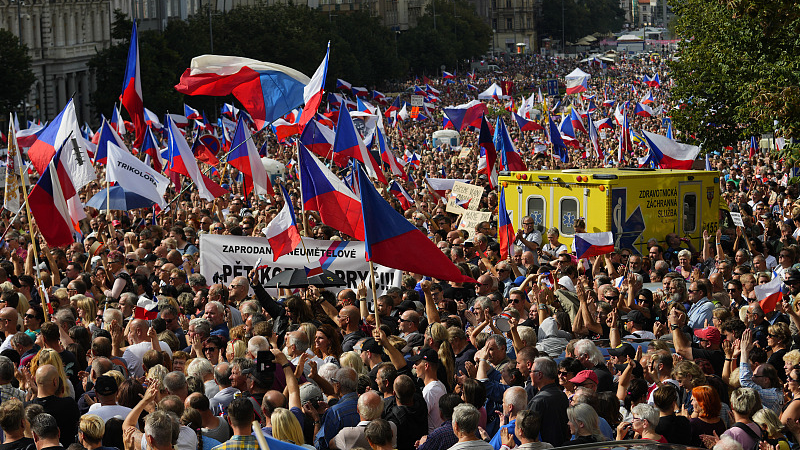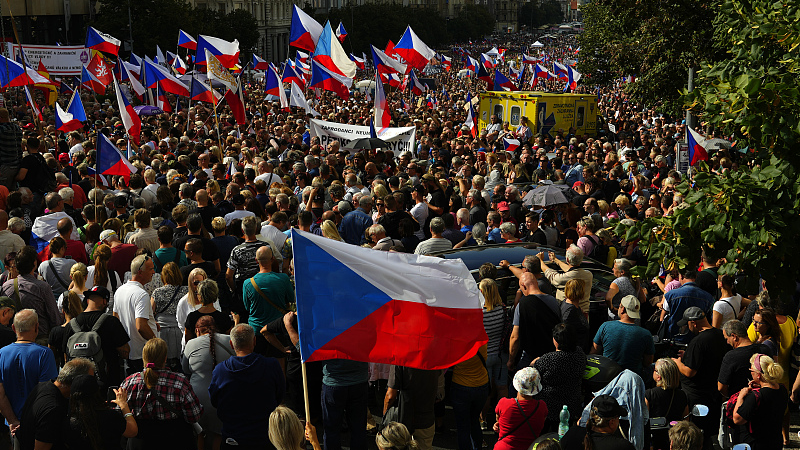
Thousands of demonstrators gather at the Wencesla's Square in Prague, Czech, September 3, 2022. /CFP
Thousands of demonstrators gather at the Wencesla's Square in Prague, Czech, September 3, 2022. /CFP
Editor's note: Bradley Blankenship is a Prague-based American journalist, political analyst and freelance reporter. The article reflects the author's opinions which are not necessarily the views of CGTN.
Prague's bustling Wenceslas Square, usually flooded with tourists this time of year, was instead packed with some 70,000 protesters these last few days. These people demanded the resignation of the ruling government headed by Prime Minister Petr Fiala of the Civic Democratic Party (ODS) because of its continued military aid to Ukraine and mismanagement of the ongoing energy crisis.
Predictably, many prominent Czech commentators, and even Prime Minister Fiala, have responded to these grievances by labeling the demonstrators as pro-Russia. Some have invoked the typical anti-communist sentiments that so often muddy the political discourse in this part of the year by invoking the former Soviet Union and its repression of Czechs' civil liberties during the 20th century.
From my perspective, I was quite shocked to see this protest since it appeared so spontaneously. Protests are not new in Prague. Over the past several years, we have seen massive protests that number in the tens of thousands over government corruption scandals – which, by the way, are apparently not waning after the ouster of the last Czech government and the installation of the new, anti-corruption ODS-led one. But there has not been such a large gathering of explicitly anti-Western demonstrators.
Protesters were heavily in opposition to the European Union as an institution, as well as the North Atlantic Treaty Organization (NATO). Both of these have been key to the Czech Republic's integration into the West since the Velvet Revolution in 1989 and the dissolution of the Soviet Union shortly thereafter. To see so many organized against these key pillars of what it means to be "Western," something I believe most Czechs deeply desire, is frankly shocking.
Yet, it does not imply, as Fiala and others suggest, that these people are necessarily pro-Russia or even united by some sort of ideology. The majority fall under three banners: the center-left populist party ANO (meaning "Yes" in Czech), the far-right Freedom and Direct Democracy (SPD) party and the far-left Communist Party of Bohemia and Moravia, which is currently not represented in the country's parliament.

Thousands of demonstrators gather at the Wencesla's Square in Prague, Czech, September 3, 2022. /CFP
Thousands of demonstrators gather at the Wencesla's Square in Prague, Czech, September 3, 2022. /CFP
Aficionados of "horseshoe theory" (which asserts that the extreme left and the extreme right, rather than being at opposite and opposing ends of a linear political continuum, closely resemble one another) need not interject. Rather, these parties are leveraging their anti-establishment views to appeal to heavily disaffected people. Given the significant rise in inflation in the country (17.5 percent as of July) and unbearable energy costs, in particular, it's not hard to see why people aren't happy with the way things are going.
To his credit, Fiala's government has recently implemented a roughly $7 billion aid package to help households affected by energy prices that is reportedly the fourth-highest of its kind in Europe relative to gross domestic product (GDP). Likewise, as Prague now holds the rotating presidency of the EU council, his government has convened an emergency meeting of the EU energy council to try to develop a European solution to this mess.
But none of this is likely to offset the burden passed onto regular people – and they know it. With Moscow's announcement on September 5 that they will halt the flow of gas to Europe until all sanctions are lifted, Russia has effectively tightened the screw that will see energy prices lift off again. The Euro instantly dropped to a new 20-year low in response. Union leaders in the Czech Republic that same day announced that they will demonstrate at Wenceslas Square on October 8 for the same reasons that drew Saturday's crowd.
Truly the only solution at this point has to be a reasonable negotiation with Russia, which can be facilitated by Western countries refusing to prop up Ukraine any longer through military aid. Liberal idealists will profess their "values" at the thought of giving into the dreaded President Putin – but reality will set in at some point.
The Czech Finance Ministry conducted a hypothetical analysis to see how a secession of Russian gas would impact the country and the results were not all that surprising. According to this prediction, the heavy damage would start next winter when GDP could see a fall of up to 2.9 percent and then 1.6 percent in 2024. That would classify as a recession, one artificially induced by the Western foreign policy line, with the attendant joblessness and destitution that comes with it.
Given what has already taken place in Prague, the chances of Czechs weathering this avoidable storm for the "rules-based international order" or the fanciful dreams of liberal idealists are basically nil. And organizing for one's own basic self-interest does not make one a traitor to their nation or a Kremlin stooge; it simply makes one a human being. It's people's lives that are ultimately at stake by artificially prolonging the conflict in Ukraine – and the Czech government, the EU and NATO would do well to remember that.
(If you want to contribute and have specific expertise, please contact us at opinions@cgtn.com. Follow @thouse_opinions on Twitter to discover the latest commentaries on CGTN Opinion Section.)

